2025人教版八年级英语下学期期中Units4~5基础知识复习课件
文档属性
| 名称 | 2025人教版八年级英语下学期期中Units4~5基础知识复习课件 | 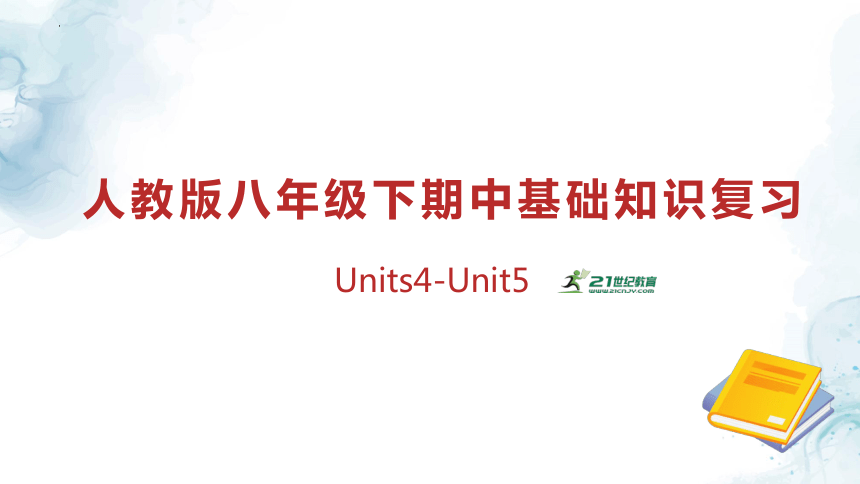 | |
| 格式 | pptx | ||
| 文件大小 | 1.4MB | ||
| 资源类型 | 试卷 | ||
| 版本资源 | 人教新目标(Go for it)版 | ||
| 科目 | 英语 | ||
| 更新时间 | 2025-03-31 21:22:55 | ||
图片预览

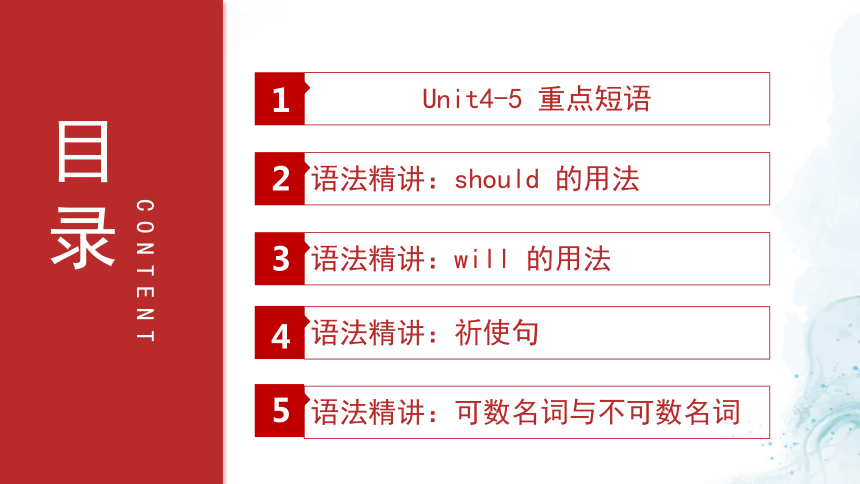
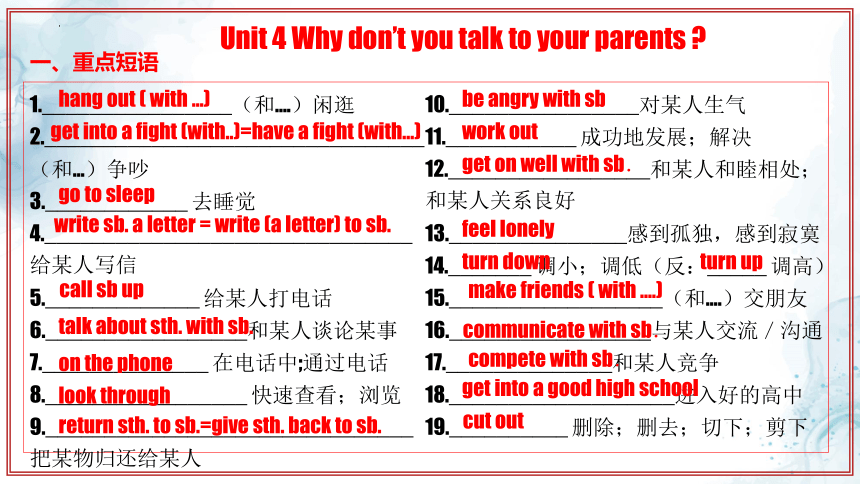
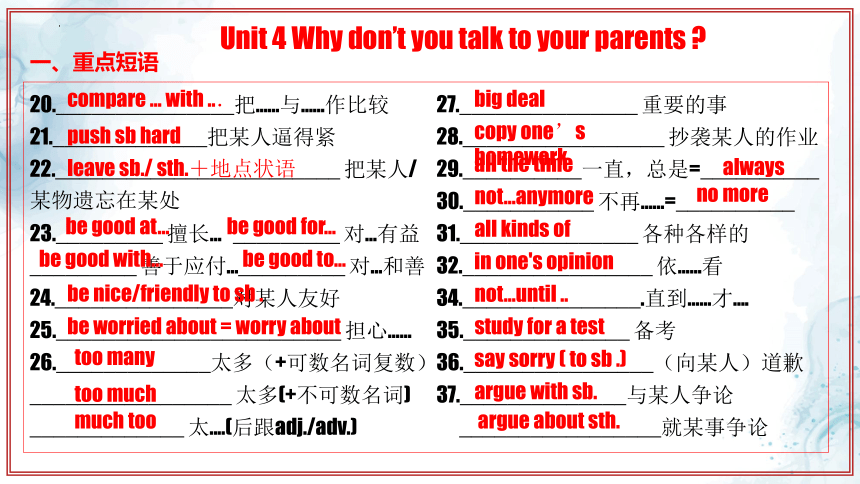
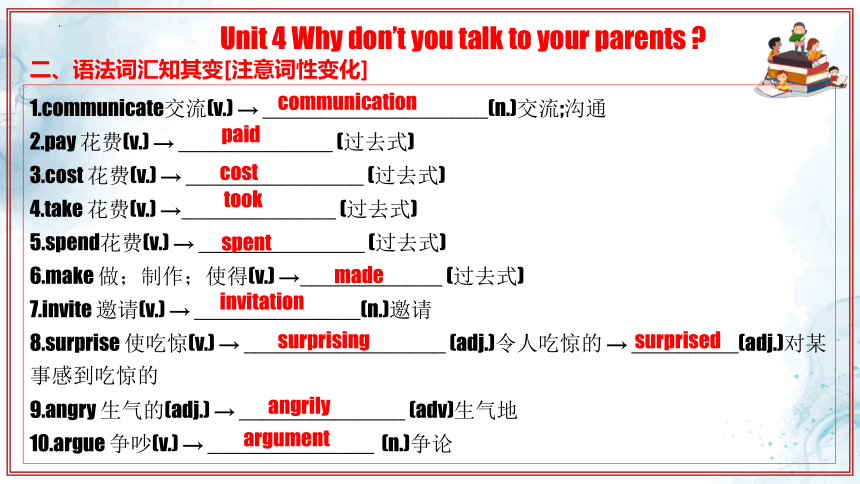
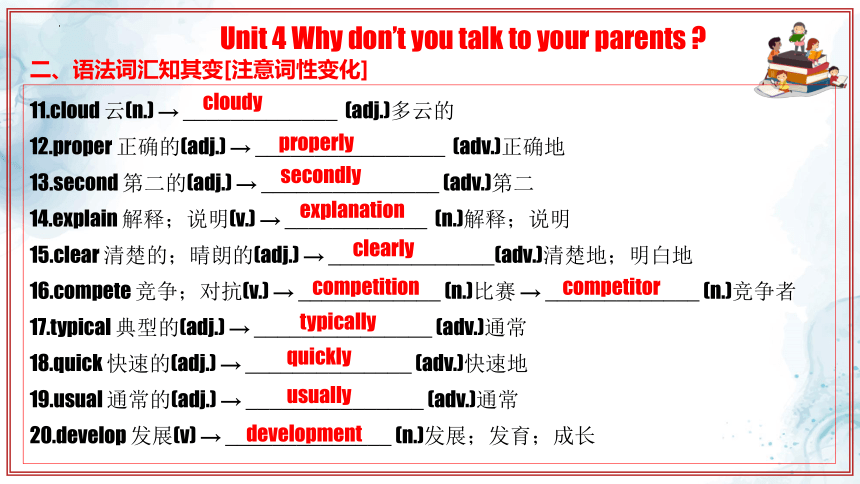
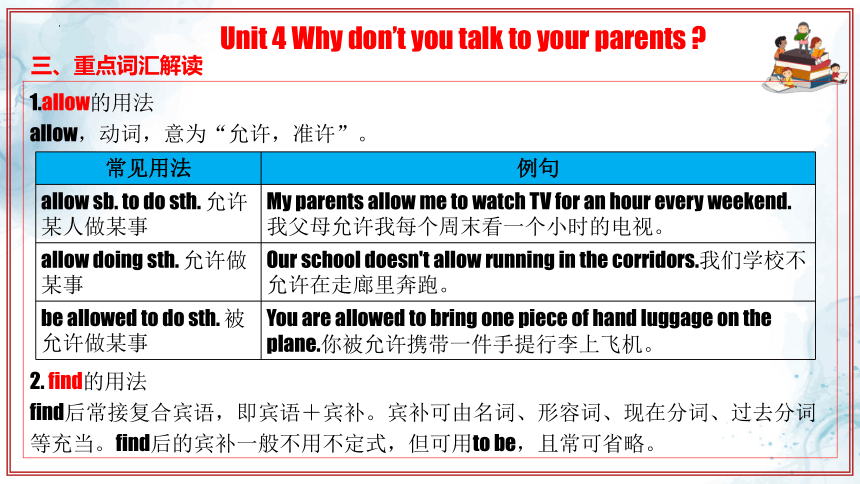
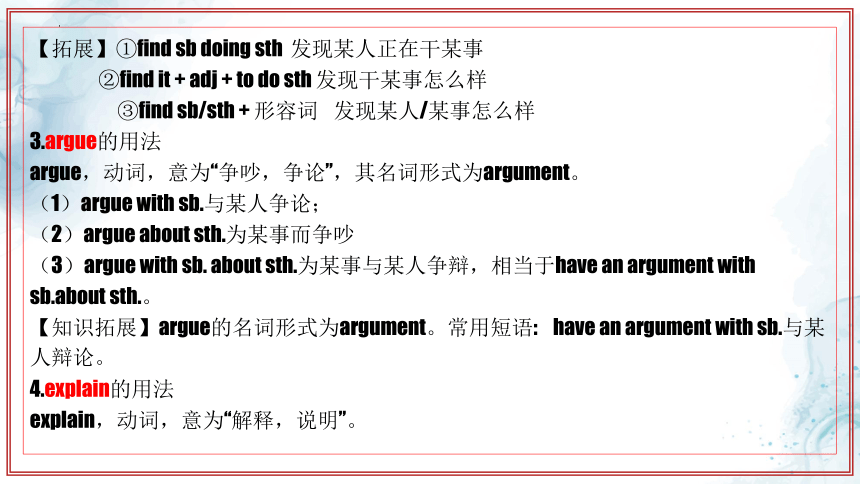
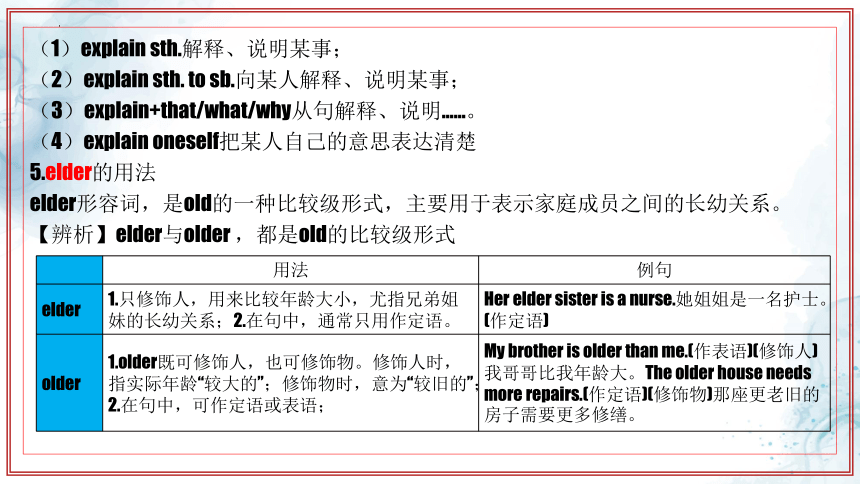
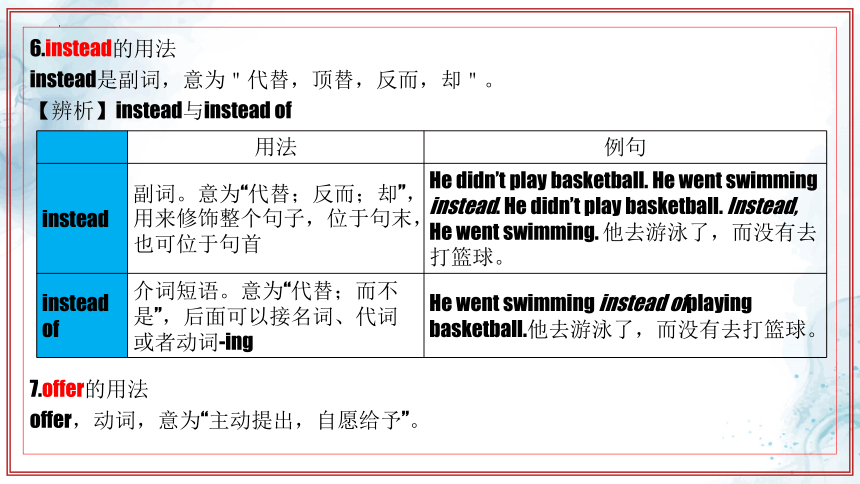
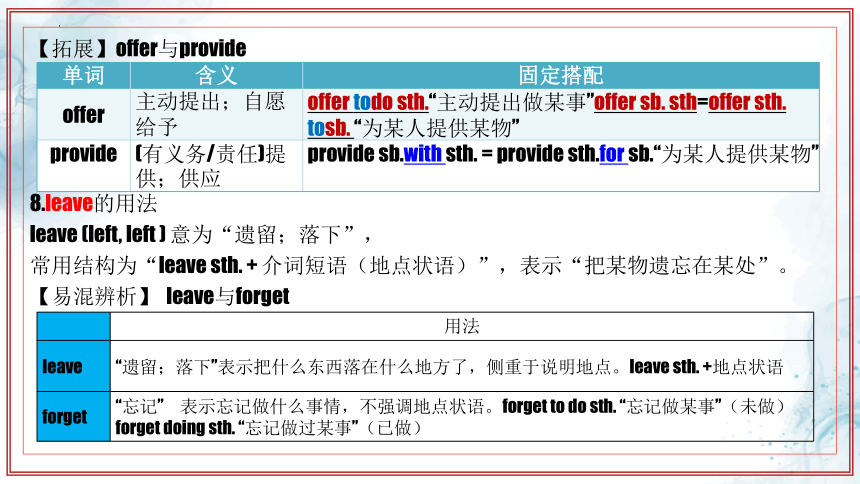
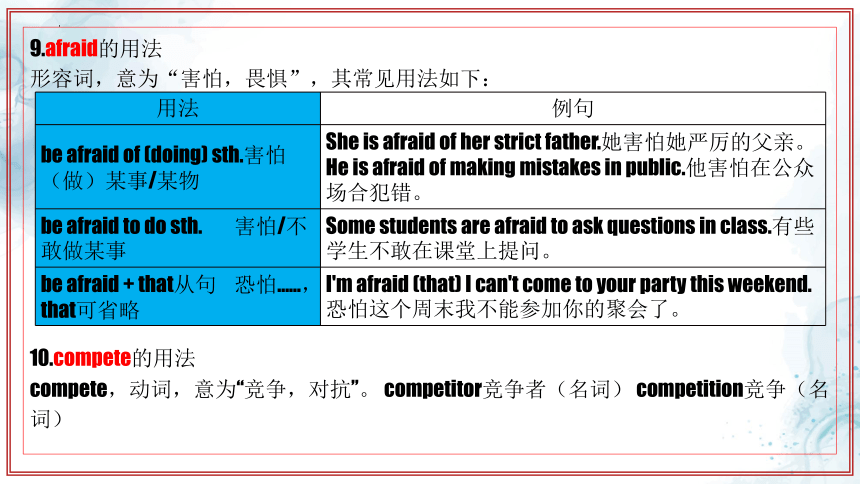
文档简介
(共50张PPT)
人教版八年级下期中基础知识复习
Units4-Unit5
目
录
CONTENT
Unit4-5 重点短语
语法精讲:should 的用法
语法精讲:will 的用法
语法精讲:祈使句
2
3
4
1
语法精讲:可数名词与不可数名词
5
Unit 4 Why don’t you talk to your parents
一、重点短语
1.________________(和….)闲逛
2.________________________________
(和…)争吵
3.____________ 去睡觉
4._______________________________
给某人写信
5._____________ 给某人打电话
6._________________和某人谈论某事
7.______________ 在电话中;通过电话
8._________________ 快速查看;浏览
9._______________________________
把某物归还给某人
10.________________对某人生气
11.___________ 成功地发展;解决
12._________________和某人和睦相处;和某人关系良好
13._______________感到孤独,感到寂寞
14._______ 调小;调低(反:_____ 调高)
15.__________________(和….)交朋友
16._________________与某人交流/沟通
17.______________和某人竞争
18.___________________进入好的高中
19.__________ 删除;删去;切下;剪下
hang out ( with …)
get into a fight (with..)=have a fight (with...)
go to sleep
write sb. a letter = write (a letter) to sb.
call sb up
talk about sth. with sb.
on the phone
look through
return sth. to sb.=give sth. back to sb.
be angry with sb
work out
get on well with sb.
feel lonely
turn down
turn up
make friends ( with .…)
communicate with sb.
compete with sb.
get into a good high school
cut out
Unit 4 Why don’t you talk to your parents
一、重点短语
20._______________把……与……作比较
21._____________把某人逼得紧
22.________________________ 把某人/
某物遗忘在某处
23._________ 擅长… _________ 对…有益
_________ 善于应付…_________ 对…和善
24._______________对某人友好
25.________________________ 担心……
26._____________太多(+可数名词复数)
_________________ 太多(+不可数名词)
_____________ 太....(后跟adj./adv.)
27._______________ 重要的事
28._________________ 抄袭某人的作业
29.__________一直,总是=__________
30.___________ 不再……=__________
31._______________ 各种各样的
32.________________ 依……看
34._______________.直到……才….
35.______________ 备考
36.________________(向某人)道歉
37.______________与某人争论
_________________就某事争论
compare … with ...
push sb hard
leave sb./ sth.+地点状语
be good at…
be good for…
be good with…
be good to…
be nice/friendly to sb .
be worried about = worry about
too many
too much
much too
big deal
copy one’s homework
all the time
always
not...anymore
no more
all kinds of
in one's opinion
not...until ..
study for a test
say sorry ( to sb .)
argue with sb.
argue about sth.
二、语法词汇知其变[注意词性变化]
1.communicate交流(v.) → ___________________(n.)交流;沟通
2.pay 花费(v.) → _____________ (过去式)
3.cost 花费(v.) → _______________ (过去式)
4.take 花费(v.) →_____________ (过去式)
5.spend花费(v.) → ______________ (过去式)
6.make 做;制作;使得(v.) →____________ (过去式)
7.invite 邀请(v.) → ______________(n.)邀请
8.surprise 使吃惊(v.) → _________________ (adj.)令人吃惊的 → _________(adj.)对某事感到吃惊的
9.angry 生气的(adj.) → ______________ (adv)生气地
10.argue 争吵(v.) → ______________ (n.)争论
Unit 4 Why don’t you talk to your parents
communication
paid
cost
took
spent
made
invitation
surprising
surprised
angrily
argument
二、语法词汇知其变[注意词性变化]
11.cloud 云(n.) → _____________ (adj.)多云的
12.proper 正确的(adj.) → ________________ (adv.)正确地
13.second 第二的(adj.) → _______________ (adv.)第二
14.explain 解释;说明(v.) → ____________ (n.)解释;说明
15.clear 清楚的;晴朗的(adj.) → ______________(adv.)清楚地;明白地
pete 竞争;对抗(v.) → ____________ (n.)比赛 → _____________ (n.)竞争者
17.typical 典型的(adj.) → _______________ (adv.)通常
18.quick 快速的(adj.) → ______________ (adv.)快速地
19.usual 通常的(adj.) → _______________ (adv.)通常
20.develop 发展(v) → ______________ (n.)发展;发育;成长
Unit 4 Why don’t you talk to your parents
cloudy
properly
secondly
explanation
clearly
competition
competitor
typically
quickly
usually
development
三、重点词汇解读
1.allow的用法
allow,动词,意为“允许,准许”。
2. find的用法
find后常接复合宾语,即宾语+宾补。宾补可由名词、形容词、现在分词、过去分词等充当。find后的宾补一般不用不定式,但可用to be,且常可省略。
Unit 4 Why don’t you talk to your parents
常见用法 例句
allow sb. to do sth. 允许某人做某事 My parents allow me to watch TV for an hour every weekend.我父母允许我每个周末看一个小时的电视。
allow doing sth. 允许做某事 Our school doesn't allow running in the corridors.我们学校不允许在走廊里奔跑。
be allowed to do sth. 被允许做某事 You are allowed to bring one piece of hand luggage on the plane.你被允许携带一件手提行李上飞机。
【拓展】①find sb doing sth 发现某人正在干某事
②find it + adj + to do sth 发现干某事怎么样
③find sb/sth + 形容词 发现某人/某事怎么样
3.argue的用法
argue,动词,意为“争吵,争论”,其名词形式为argument。
(1)argue with sb.与某人争论;
(2)argue about sth.为某事而争吵
(3)argue with sb. about sth.为某事与某人争辩,相当于have an argument with sb.about sth.。
【知识拓展】argue的名词形式为argument。常用短语: have an argument with sb.与某人辩论。
4.explain的用法
explain,动词,意为“解释,说明”。
(1)explain sth.解释、说明某事;
(2)explain sth. to sb.向某人解释、说明某事;
(3)explain+that/what/why从句解释、说明……。
(4)explain oneself把某人自己的意思表达清楚
5.elder的用法
elder形容词,是old的一种比较级形式,主要用于表示家庭成员之间的长幼关系。
【辨析】elder与older ,都是old的比较级形式
用法 例句
elder 1.只修饰人,用来比较年龄大小,尤指兄弟姐妹的长幼关系;2.在句中,通常只用作定语。 Her elder sister is a nurse.她姐姐是一名护士。(作定语)
older 1.older既可修饰人,也可修饰物。修饰人时,指实际年龄“较大的”;修饰物时,意为“较旧的”;2.在句中,可作定语或表语; My brother is older than me.(作表语)(修饰人)我哥哥比我年龄大。The older house needs more repairs.(作定语)(修饰物)那座更老旧的房子需要更多修缮。
6.instead的用法
instead是副词,意为"代替,顶替,反而,却"。
【辨析】instead与instead of
7.offer的用法
offer,动词,意为“主动提出,自愿给予”。
用法 例句
instead 副词。意为“代替;反而;却”,用来修饰整个句子,位于句末,也可位于句首 He didn’t play basketball. He went swimming instead. He didn’t play basketball. Instead, He went swimming. 他去游泳了,而没有去打篮球。
instead of 介词短语。意为“代替;而不是”,后面可以接名词、代词或者动词-ing He went swimming instead ofplaying basketball.他去游泳了,而没有去打篮球。
【拓展】offer与provide
8.leave的用法
leave (left, left ) 意为“遗留;落下”,
常用结构为“leave sth. + 介词短语(地点状语)”,表示“把某物遗忘在某处”。
【易混辨析】 leave与forget
单词 含义 固定搭配
offer 主动提出;自愿给予 offer todo sth.“主动提出做某事”offer sb. sth=offer sth. tosb. “为某人提供某物”
provide (有义务/责任)提供;供应 provide sb.with sth. = provide sth.for sb.“为某人提供某物”
用法
leave “遗留;落下”表示把什么东西落在什么地方了,侧重于说明地点。leave sth. +地点状语
forget “忘记” 表示忘记做什么事情,不强调地点状语。forget to do sth. “忘记做某事”(未做)forget doing sth. “忘记做过某事”(已做)
9.afraid的用法
形容词,意为“害怕,畏惧”,其常见用法如下:
pete的用法
compete,动词,意为“竞争,对抗”。 competitor竞争者(名词) competition竞争(名词)
用法 例句
be afraid of (doing) sth.害怕(做)某事/某物 She is afraid of her strict father.她害怕她严厉的父亲。He is afraid of making mistakes in public.他害怕在公众场合犯错。
be afraid to do sth. 害怕/不敢做某事 Some students are afraid to ask questions in class.有些学生不敢在课堂上提问。
be afraid + that从句 恐怕……,that可省略 I'm afraid (that) I can't come to your party this weekend.恐怕这个周末我不能参加你的聚会了。
【固定搭配】(1)compete with sb.与某人竞争。
(2) compete against sb. for sth.为得到某物与某人竞争。
11.look through的用法
look through浏览,看一遍,翻阅
【拓展】与look有关的词组
12.continue的用法
look
look forward to盼望;期待
look out当心;小心
look up仰视;查阅
look at看
look for寻找
look around环视
固定搭配 用法
continue doingsth. =go on doingsth. 继续做某事(前后做同一件事)
continue to dosth. go on to dosth. 继续做某事(前后不是同一件事)
pare的用法
compare 动词,比较
【易混辨析】compare ... with ...与compare ... to ...
14.cause的用法
cause,动词,意为“造成,引起”。
①cause sb. to do sth.意为“导致某人做某事”。
②cause sb. trouble给某人带来麻烦;
③cause sth. for sb.为某人造成某种问题。
固定搭配 用法
compare ...with... 表示“把…与…比较”,常用于同类事物之间的比较
compare ... to ... 表示“把…比作…”,常用于不同类事物之间的比较或比喻
15.turn down的用法
turn down“调低,关小”。turn down动副短语,后跟名词作宾语时,宾语置于副词前后均可;后跟代词作宾语时,代词置于动副之间。
【拓展】turn构成的短语
turn up调高,开大 turn on 打开(电源、煤气等) turn off关闭
16.push的用法
push,动词,意为“鞭策,督促,推动”。push sb. to do sth.督促某人做某事。
【拓展】
push away推开,拒绝 push on继续前行
push one’s way挤着前进 push through使通过,使得到批准
17.get on with的用法
get on with和睦相处,关系良好。get on with sb.也可用get along with sb.表达。表达“相处得如何”,可以在with前加well(好)或badly(差)等修饰词,即get along/on well/badly with sb.。
【拓展】
get on with sth.开始(或继续)做某事,进展。
18.return的用法
return 动词 归还 返回
【拓展】
①、return sb sth=return sth to sb =give sth back to sb把某物还给某人
②、return to+地点= get back to+地点:返回某地
③、return home回家 return here回这 return there回那里
19.development的用法
development为不可数名词,意为“发育;发展;成长”。
拓展:① develop 为动词;意为“发育;发展;发达”,可作及物或不及物动词。
② develop的形容词有两个: developed意为“(经济)发达的”和 developing意为
“(经济)发展中的”。
四、句型解读
1.Why don't you talk to your parents 你为什么不和父母说说呢?
【详解】Why don' t you do sth. 是常见的提建议的句型,意为“你为什么不做某事呢 ”,与Why not do sth. ”同义
---Why don' t you talk to your friend 你为什么不和你的朋友谈谈呢 ---Good idea! 好主意!
该句型还有发出礼貌地邀请的用法。
Why not go to the movies with us 为什么不跟我们一起去看电影呢
I’d like to, but I have to study for the test.我很想去,但我得准备考试。
拓展:表示邀请或建议的句型
①What/ How about.., 意为“…… 怎么样/好吗
What/ How about watching TV 看电视怎么样
Sounds boring. 听上去很乏味。
Unit 4 Why don’t you talk to your parents
② Would you like sth. 意为“你想要某物吗 ”
Would you like some apples 你想要一些苹果吗
Yes, please. Thanks.是的,请来几个。/不,谢谢.
③ Let' s do sth.意为“咱们做某事吧”。 Let' s sing a song!咱们唱首歌吧!
OK /All right. /Good idea/Sounds great./ Why not 行。/好的。/好主意。/听起来很好。/为什么不呢
④ You should(not) do sth.意为“你(不)应当做某事”。
You should go to the doctor.你应当去看医生
You shouldn't talk to your parents like this.你不应该这样对你父母说话。
⑤You' d better(not) do sth.意为“你最好(不)做某事”
You' d better call her at once,你最好马上给她打电话。
You' d better not go out.你最好不要出去。
⑥Would you mind ……?你介意做....吗?
Would you mind opening the door?你介意打开门吗?
2.I'm really tired because I studied until midnight last night.(教材第25页)我真的很累因为我昨晚学习到半夜。
【详解】until为介词,意为“直到…为止”,同义词为till。
It may last until tomorrow.它可能要延续到明天。
Nothing happened until supper.直到晩饭时没有发生什么事。
She didn't come home until eleven o' clock,她直到11点才回家。
拓展:until为连词,意为“直到…为止”,引导时间状语从句。
I will stay with you until your mother comes back.我会和你待在一起,直到你妈妈回来。
辨析:till和until
till和until既可用作介词也可用作连词引导状语,until是till的强调形式,但是它们表达的意义基本是相同的.till是指直到某一特定事件发生的时候,而在那个时刻之后,该事情或状况仍将持续.until是指直到某一特定事件发生的时候,而讲话的人在自己心里认为,在那个时刻之后,该事情或该状况将中止(不怎么可能持续)通常有以下几种用
①用于肯定句作“直到…为止”解时,主句的动词一般是延续到till/until所表示的时间为止。
He waits till/until the children are asleep. 他等着直到孩子们睡熟。
I shall stay here till/until twelve o'clock. 我将留在这里一直到十二点钟。
②用于否定句作“在…以前”、“直到才”解时,主句的动词一般是非延续性的,它所表示的动作直到till/until所表示的时间才发生。
He didn't come till/until late in the morning. 他直到早上很迟才来。
He didn't arrive till/until the game had begun. 直到比赛开始他才到。
注意:主句为一般将来时,till/until引导的从句用一般现在时代替将来时。
The bus will not go till/until all the people get on it. 直到所有的人都上了车,车才开走。
③用于延续性动词的肯定或否定句中,till/until和not... till/until...其含义不同。
The meeting continued until /till 7:00. 会议一直开到七点。
We didn't have the meeting until /till 7:00. 直到七点我们才开始会议。
④用于“not...until...”的句式可以转换成when 或after引导的时间状语从句,但主句必须要用肯定形式。They didn't get off until the train came to a complete stop.
=They got off after the train came to a complete stop. 火车停了他们才下车。
The student won't come into the classroom until the teachers finish their work.
=The students will come into the classroom when the teachers finish their work.
当老师们完成工作时,学生们将走进教室。
⑤用于“It is / was not until+ (被强调部分) + that+(其它成分) (that后面肯定句)”或含有“not...until...”的强调结构中,其中的until不能改为till。
It was not until the film had begun that he arrived. 直到电影开始他才到。
It is not until 8:00 that we begin our class every day. 我们每天八点开始上课。
⑥not until放在句首时,句子要倒装,其中的until不能改为till。
Not until the last moment did he change his mind. 直到最后一刻他才改变主意。
Not until midnight did it stop raining. 直到午夜雨才停。
3.Hope things work out.希望一切顺利。
work out属于“动词+副词”的短语搭配,意为“解决;成功地发展”。
如果宾语是名词,既可以放在out前,也可以放在out后;若宾语是代词,只能放在work和out之间。
例:I hope the project can work out fine. 我希望这个项目能顺利发展。
She is experienced enough to work out the problems. 她足够有经验,能够解决这些问题。
【拓展】动词+out
check out 查证 turn out 结果是 go out 出去 give out 分发;发放
find out查明 run out用完 try out试用;试验 set out动身;出发
4.People shouldn’t push their kids so hard. 人们不应该对自己的孩子逼得太紧。
【详解】push,动词,意为“鞭策,督促,推动”。push sb. to do sth.督促某人做某事。
If you always push him too hard, he may make mistakes.要是你老是逼他太紧,他可能会出错。
We always have to push him to do his homework.我们总是不得不督促他做作业。
【拓展】
push away推开,拒绝
push on继续前行
push one’s way挤着前进
push through使通过,使得到批准
until,so that,although的用法
1. until的用法
(1)作介词,表示"直到……为止"。
The meeting may last until Friday. 会议可能要延续到星期五。
Mark will be working until 5 o’clock. 马克将一直工作到五点钟。
【注意】由上面两个例句可知:until用于肯定句中表示动作一直持续到until短语所表示的时间为止,即表示动作的终点,意为"直到……为止"。在这种用法中,句子的谓语动词必须是延续性动词,如:live,wait,last,love,like,stay,work等。
(2)作连词,表示"直到……为止;在……以前;不到……(不)"。
①用于肯定句中
Please wait here until I come. 请在这里等到我来。
②用于否定句中
五、语法讲解
Unit 4 Why don’t you talk to your parents
I won’t stop shouting until you let me go. 你不放开我,我就一直喊叫。
【注意】 until作连词用于否定句中,从句的动作先发生,主句的动作后发生,意为"直到……才……"。
2. so that的用法
(1)so that引导目的状语从句,从句谓语动词常用情态动词may/might/can/could等。
We went early so that we could get good seats. 为了占到好座位,我们早早就去了。
(2)so that引导目的状语从句,当主句主语与从句主语一致时,可用"so as to(in order to)+动词原形"转化为简单句。
He got up early so that he could catch the early bus.
=He got up early in order to/so as to catch the early bus.
为了赶早班公交车他起床很早。
(3)so that还可以与in order that互换。
He worked day and night so that/in order that he could succeed. 他夜以继日地工作为的是成功。
【知识拓展】
so...that...表示"如此……以至于……",引导结果状语从句。
The boy is so young that he can’t go to school. 这个男孩太小还不能去上学。
3. although的用法
(1)although较正式,引导的从句放在主句的前后均可。
Henry often helps me with my math although he is quite busy. 尽管亨利很忙,但是他经常帮助我学习数学。
(2)although不能与but连用,但可与yet,still连用。
虽然他老了,但是他工作努力。
Although he was old, but he worked hard.(×)
Although he was old, he worked hard.(√)
Although he was old, yet he worked hard.(√)
1.(2023·上海·中考真题)The team completed the task ________ they had met with many difficulties.
A.until B.though C.unless D.because
2.(2023·江苏徐州·中考真题)Let’s take the simple steps today ________ we will save the world for our grandsons and granddaughters tomorrow.
A.unless B.until C.so that D.though
3.(2024·四川泸州·中考真题)You will never truly understand your parents’ great love ______ you grow up.
A.until B.if C.since D.as
4.(2023·甘肃武威·中考真题)Let’s wait ________ the rain stops.
A.so B.while C.since D.until
5.(2023·内蒙古·中考真题)Our teacher asks us to read newspapers every day ________ we can find out what’s going on around the world.
A.so that B.even though C.in order to D.as soon as
语法专练
√
√
√
√
√
Unit 5 What were you doing when the rainstorm came
一、重点短语
1._______________在...的时候
2.______________等候...
3.______________ 寻找...
4. ________(闹钟)发出响声(后无宾语)
5.____________ 醒来;弄醒,唤醒
6._____________ 接电话
7._____________________ 洗(热水)澡
8.__________________感觉像……
9._______________务必;确保;查明
10.___________= _____________ =
__________________ 玩得开心玩得开心
11._________________.敲打……
12._______________ 起初;起先
13._____________进入梦乡;睡着
14.____________ 逐渐变弱;逐渐消失
15.____________ 凌乱不堪;乱七八糟
16._________________ 使……支离破碎
17.________________ 拉近...的距离
18._________________ 互相帮助
19.__________________在困难时期
20.________________ 弹钢琴
21.________ 打开(反:_______关上)
at the time of...
wait for...
look for...
go off
wake up
pick up
take a ( hot ) shower
feel like...
make sure
have fun
have a good time
enjoy oneself
beat against..
at first
fall asleep
die down
in a mess
break... apart
bring...closer
help each other
in times of difficulty
play the piano
turn on
turn off
一、重点短语
23._______________ 听收音机
24.________________________到达
25._______________________ 因为...
26.________________ 费力地前进...
27.________________路过
28._________________在……旁边
29.________________说实话
30.________________ 在历史上
31.___________________ 例如
32.______________________被杀
33._______________ 通过收音机
34.__________________ 沉默地;无声地
______________惊讶地
35._________________ 剩余的….
36.__________向……外面看;看向……外面
37._____________ 拆除;往下拽;记录
38.__________________对某人有(特殊的)意义
39._______________ 离开;消失
40._______________ 指出
41.________________ 也(肯定/句尾)
42._______________ 大声呼叫
Unit 5 What were you doing when the rainstorm came
listen to the radio
get to = arrive in(大) / at(小)
because of +n./代/v.-ing
make one's way to...
walk by
by the side of...
to tell the truth
in history
for example
be killed=get killed
on the radio
in silence
in surprise
the rest of
look out of...
take down
have meaning to sb.
go away
point out
as well
call out
二、语法词汇知其变[注意词性变化]
1.heavy adj重的→ _____________ adv.在很大程度上;大量地
2.sudden adj.突然的→_______________ adv.突然;忽然
3.complete adj.彻底的 v.完成→___________________ adv.彻底地
4.recent adj.最近的→ ________________ adv.不久前;最近
5.wind n.风→_____________ adj.多风的
6.ice n.冰→ _______________ adj.覆盖着冰的;冰冷的
7.wood n.木头→_______________ adj.木质的
8.report v.& n .报道;公布→ _____________n.记者
9.terror n.恐惧→__________________ n.恐怖分子
10.strange adj.奇怪的;陌生的→________________ n.陌生人
Unit 5 What were you doing when the rainstorm came
heavily
suddenly
completely
recently
windy
icy
wooden
reporter
terrorist
stranger
二、语法词汇知其变[注意词性变化]
11.silent adj.沉默的,安静的→______________ n.沉默;无声
[类似变形 different;important;independent]
12.sleep v.& n.睡觉→ _________adj.睡着(的) → ___________ adj. 困倦的;冷清的
(wake v.醒来→_______________adj.醒着的)
13.shock v.(使)震惊→ ____________ adj.震惊的
14.fall v.倒塌→________(过去式)→_____________ (过分)/adj.倒下的;落下的
15.true adj.真的→___________ adv.真正地→ ____________ n.实情;事实
16.match n.火柴;比赛→ _____________ pl.
17.begin v.开始→_______________(过去式)
18.beat v.敲打;打败→______________(过去式)
19. rise v.升起;提高;增加→______________(过去式)
Unit 5 What were you doing when the rainstorm came
silence
asleep
sleepy
awake
shocked
fell
fallen
truly
truth
matches
began
beat
rose
三、重点词汇解读
1. go off的用法
go off为不及物动词短语,在此意为"发出响声",可指闹钟或警报器等突然发出声响。
【知识拓展】
(1) go off意为"(灯)熄灭;停止运转;离开"。
(2) go off还可以表示"变质,变坏"。
【拓展】 go的短语小结:
(1) go down下降 (2)go out出去 (3)go away离开 (4) go back回去(5) go on继续
(6) go over仔细检查 (7) go up上升增长
2. beat 的用法
beat v. 敲打;锤砸;过去式为beat,过去分词为beaten。
(1)作“击打”讲时,主语是人,宾语可以是人,也可以是物。
Unit 5 What were you doing when the rainstorm came
(2)作“拍打”讲时,主语多为风、雨、海浪等名词。“拍打在某地方”常用at, on, against等引起的介词短语。
(3)beat有“打败;战胜”的意思,其后常接人或由人组成的队。
【易混辨析】
3.begin的用法
1)begin to do sth. = begin doing sth. 开始做…
I began to cook/cooking dinner after finishing my work.
【注意】begin只能用to do的情况:
①本身用进行时态时 ②主语是sth.时
用法 例句
beat beat, beaten 意为“击败,战胜”一般接对手作宾语 —What an exciting match it was! Our teamwonthe game.—In fact, it was hard tobeatthem.
win won, won意为“获胜,赢得”一般后接比赛、奖品或奖项作宾语
③begin +表达心理活动的动词(如like, know, understand, think, realize等),
2)begin with 以…开始
3)to begin with=at first 首先;起初
【拓展】
①beginning n. 起初,开端,在开始时 ②at the beginning of + 时间/地点
③at the beginning of this term/road ④from beginning to end 从头至尾
⑤from the beginning 从一开始
4.pick up的用法
pick up意为"接电话”.pick up有如下含义:
接电话 The phone rang. I didn't pick up because I was busy.电话响了,我没有接电话,因为我很忙.
检起;拾起 Please pick up the ruler on the ground.请把地上的尺子检起来.
搭载;接人 My mother agreed to drive her new ear to pick me up.我妈妈同意开着她的新车来接我
注意:pick it up把它捡起来 pick them up把它们捡起来
pick up the book= pick the book up把书捡起来
(注意人称代词放中间,名词放中间放后面都可以)
5.against的用法
1)倚着,靠着
Our teacher is standing against the door. 我们的老师靠门而站。
2)反对,违反 (反义词为for)
be against 反对 fight against 与...作斗争 play against 与...对抗
6.light的用法
light n.光;光线;光亮。此时为不可数名词。
【词性】1)n. 光;光线;发光体;灯
2)adj. 明亮的;浅色的;轻松的;轻的
3)v. 点燃,照亮; 过去式lit
7.report的用法
1)v. 报告,报道,汇报
①report sb sth. = report sth. to sb. ②report that+从句
2)n. 报告, 报道
make a report on…作关于……的报告 a report card 成绩报告单
3)It is reported that...据说, 据报道
【拓展】reporter n.记者
8.while的用法
while作从属连词,意为“当......的时候,在......期间”,引导时间状语从句其谓语动词必须为延续性动词。它强调主句的动作在从句动作的过程中发生,或者主句的动作与从句的动作同时发生,且持续时间一般较长。
例:He fell asleep while he was listening to music. 他在听音乐时睡着了,
While we were talking, he came in. 我们在谈话时,他进来了.
辨析:while与when
【拓展】
while与when在过去进行时中位置的转换:
While John was playing the piano,Mary left the house 约翰在弹钢琴时,玛丽离开了家。
=John was playing the piano when Mary left the house. 当玛丽离开家时,约翰在弹钢琴。
9.leave的用法
leave动词,意为“离开”
leave的常用搭配:
①“leave for+地点”动身前往某地
②“leave+地点+for..."离开某地前往
while “当......的时候”“在......期间",其谓语动词必须为延续性动词,常用于过去进行时态中
when “当......的时候,其谓语动词可以是延续性动词,也可以是非延续性动词
③“leave + sth + 地点”把某物忘记在什么地方
10.rise的用法
rise为不及物动词,过去式为rose,过去分词为risen。不能用于被动语态。意为"上升" "升起" "起身" "起立(此时主语是人)"、"上涨",以及"(日、月、星等)升起到地平线上"。
【易混辨析】 rise与raise的区别
11.hear的用法
hear动词,意为"听说"。常用结构为:
rise 为不及物动词,后面要带上介词后才能加宾语。指依次上升,如自然界的日、月、星、雾、云的上升,人体从睡、跪、坐、躺等姿势站立起来等。 Prices rise every day in those countries. 在那些国家物价天天上涨。
raise 是及物动词,表示"举起",后面要直接跟宾语。此外,raise有"饲养、供养"的意思。 If you have any questions, raise your hands. 如果你有问题,请举手。 Their family raised a big dog. 他们家养了一条大狗。
(1)hear sb do sth意为"听见某人做某事"。
(2)hear sb doing sth意为"听见某人正在做某事"。
(3)hear of /about sb / sth意为"听说某人或某事"。
(4)hear from sb 意为"收到某人的来信"。
(5)hear+that从句意为"听说……"。
12.happen的用法
happen v.发生;碰巧。 “发生”没有被动语态,主语是物,强调某事发生的偶然性。
【常见用法】
①happen to do sth. 某人碰巧做某事
②sth. happen to sb. 某事发生在某人身上
③It happened that…碰巧
【注意】take place 和happen
take place一般指事情的发生有某种原因或经过事先的计划安排;
happen一般指事件的发生是偶然性的或突发性的。
13.asleep的用法
asleep为形容词,“睡觉的,睡着的”,在句中常作表语。
常用短语 fall asleep “入睡”,fall用作系动词,asleep作表语。
【易混辨析】
用法 例句
sleep 作延续性动词,意为"睡觉",作名词,意为"睡眠"。 He slept for two hours. /He had a long sleep.
be asleep 睡着,强调状态。 The boy was asleep with his head on his arms.
fall asleep 入睡,表示动作的过程,侧重于指无意识地入睡。 The old man sat in his chair, closed his eyes and fell asleep.
get to sleep 睡着,入眠,强调进入睡眠状态,多用于否定句、疑问句或条件句中。 I can’t get to sleep.
14.remember 的用法
动词,意为 “记得;想起;记住”。
①remember to do sth. 表示 “记得去做某事”,强调动作尚未发生。
②remember doing sth. 表示 “记得做过某事”,强调动作已经发生。
15.trouble的用法
n. 困难;苦恼;忧虑 常见用法:
①交际用语。 你怎么啦?
What's the trouble with you = What’s the matter with you = What’s wrong with you
②in trouble 处于困境中
③get sb. into trouble 使某人陷入困境
④have trouble (in)doing sth 做某事有麻烦
16.at first的用法
at first意为"首先,最初",通常用于句首或句末,与后来发生的事情相对照,其反义短语为at last,意为"最后,最终"。
【易混辨析】
17.point out的用法
point out意为"指出,指明,表明",修饰的宾语为代词时放在point与out之间。
【拓展】
point at的意思是"指向",相当于point to,二者一般可互换。point to 指向较近之物。point at指向较远之物,point 后可直接跟名词/代词作宾语,point...at...表示"将……指向……"。
at first 与at the beginning同义,表示"起初(但后来……)",与后来发生的事相对照。 At first I wasn’t sure if I could continue it. 起初我不确定能否继续经营下去。
first of all 与first同义,表示"首先;最重要",说明顺序,后面常接next,then等。 First of all, open the window. 首先,打开窗户。
18.rest的用法
rest为名词,表示"剩余部分;其余"。常与the连用,既可指人,也可指物。常用结构为"the rest of+名词"。"the rest of+复数名词"作主语时,谓语动词用复数;"the rest of + 不可数名词"作主语时,谓语动词用单数。
The rest of the apples are yours. 剩下的苹果是你的。
The rest of the bread isn’t enough. 剩下的面包不够了。
19.in silence的用法
in silence是固定短语,意为“沉默;无声”,其中 silence是名词,意为“沉默;缄默;无声”.
【拓展】
①silent adj. 沉默的 keep silent保持沉默
②silently adv.沉默地 -ly是副词后缀
③silence n. 沉默;无声 in silence沉默;无声
四、句型解读
1. Ben’s dad was putting pieces of wood over the windows while his mom was making sure the flashlights and radio were working .本的爸爸正在把木头块搭在窗户上面,而他的妈妈正在确保手电筒和收音机能正常使用。
【详解】该句是While引导的时间状语从句。
while引导时间状语从句,强调动作同时在发生,句子中都是延续性动词。
While I was reading a book, my mother was cooking dinner in the kitchen.
当我在看书的时候,我妈妈在厨房做晚饭。
While引导的时间状语从句 When引导的时间状语从句
(1)动词:延续性动词 (1)动词:延续性动词和瞬间性动词
(2)时间:时间段 (2)时间:可以是时间点,也可以是时间段
(3)时态:过去进行时 (3)时态:过去进行时和一般过去时
While I was doing my homework, my brother was playing the guitar.我在做作业的时候,我弟弟在弹吉他。
Unit 5 What were you doing when the rainstorm came
When I got home, my mother was cooking dinner.我到家的时候,我妈妈正在做晚饭。
2. ...Kate was still making her way to school. ……凯特还在前往学校的路上。
【详解】make one’s way中的one’s在句中常换成与主语一致的物主代词。make one’s way to/towards + 地点意为"前往某地,到某地方去"。
Will you be able to make your way to the bus stop 你能自己去汽车站吗?
He was still making his way though it was raining heavily. 尽管雨下得很大,他仍然在前进。
【知识拓展】
(1)by the way 为固定短语,意为"顺便提一下"。
By the way, what’s the time 顺便问一下,几点了?
By the way, where did you buy this dress 顺便问一下,你在哪里买的这件连衣裙?
(2)on the / one’s way to +地点意为"在去……的路上"。当表示地点的词是副词时,则要省略to。
I met my sister on my way to the station. 在去车站的路上,我遇到了我的姐姐。
(3)lose one’s way为固定短语,意为"迷路"。
I almost lost my way yesterday. 昨天我差点迷了路。
3.I looked out of the window and realized that it was true. 我往窗外看,意识到那是真的。
【详解】look out of the window 向窗外看
【注意】look out表示"当心,留神"。
Look out! There is danger ahead. 当心!前面危险。
【易混辨析】
real 形容词,"真的",指客观上存在,并非想象和虚构的,它是与"假冒,无"相对而言的。[] Let’s give him some real English food to eat. 让我们给他一些正宗的英国食品吃。
true 指故事、说法、答案等与标准事实、实际情况相符合,意为"真的,真实的"。true与"编造的,虚假的"相对,在句中作定语或表语。 It is true that she married that doctor. 她嫁给了那个医生,这是真的。
truth 是名词,指事情的真相或事实。 He cannot hide the truth. 他不能掩盖真相。
过去进行时
(一)、基本用法
1、过去进行时的概念
过去进行时表示在过去某一时刻或某一段时间正在进行的动作。
2、过去进行时的构成
过去进行时由“助动词be(was/were)+现在分词”构成。当主语是第一人称和第三人称单数时,要用was,其他则用were。
Linda was drawing pictures at five yesterday afternoon.昨天下午五点琳达正在画画。
The children were doing their homework from 6:00 to 8:00 yesterday evening.昨晚六点到八点孩子们正在做作业。
五、语法讲解
Unit 5 What were you doing when the rainstorm came
3、过去进行时的基本句式
结构 肯定句 主语+was/were + 现在分词
In 2022,she was studying in a university.2022年的时候她在上大学。
否定句 主语+was/were not +现在分词
This time yesterday Jack was not watching TV.He was repairing his bike.昨天这个时候,杰克不是在看电视,而是在修理自行车。
一般疑问句 was/were + 主语+ 现在分词肯定回答: Yes,主语+was / were.否定回答:No,主语+wasn't / weren't.
Were you playing basketball at four yesterday afternoon 昨天下午四点你们在打篮球吗 Yes,we were./No,we weren’t.是的,我们在打。/不,我们没打。
特殊疑问句 疑问词+was / were+主语+动词-ing形式
What were you doing at this time yesterday 昨天这个时候你在做什么 What was he researching all day last Sunday 上周日他一整天都在研究什么
时间标志词 then,at that time,at ten yesterday,at this time yesterday,this morning,the whole morning,all day,from nine to ten last evening,when,while等.
(二)、特殊用法
when和while引导的时间状语从句中过去进行时的应用。
when和while都可意为“当…...时”,可与过去进行时连用,表示主句动作发生的背景。
1.主句中动作先于从句中动作发生,且进行的时间较长时,主句用过去进行时(从句常用一般过去时)。
We were playing outside when it began to rain.我们正在外边玩,这时下起雨来了。
2.从句中动作先于主句中动作发生,且进行的时间较长时,从句用过去进行时(主句用一般过去时)。
While I was watching the basketball game, suddenly the ball flew over and hit me.当我正在看篮球赛时,突然球飞了过来并打中了我。
3.若主从句动作开始时间不存在先后关系(即时间发生)或无所谓先后时,主从句可同时使用过去进行时,此时的时间状语从句一般由while引导。
I was doing homework while my father was watching TV.我做作业的时候爸爸正在看电视。
(三)、难点突破
1、过去进行时表示过去某一段时间内一直进行的动作,常与the whole day, all day yesterday等时间状语连用。有时没有明显的时间状语,可根据上下文语境判断。
We were having classes all day yesterday.我们昨天整天都在上课。
2、过去进行时表示过去某一时刻正在进行或发生的动作,与表示过去某一时间点的时间状语连用,如at three o’clock yesterday afternoon, at this time yesterday等。
I was taking a walk at nine last Monday morning.上周一上午九点我正在散步。
(四)、与一般过去时的区别
一般过去时着重表示过去某个时候发生了某件事情,强调所做的动作已完成;过去进行时表示某个动作在过去某个时候正在发生或进行,强调动作正在进行。
I did my homework yesterday evening.我昨晚做了作业。(表示did这个动作在昨晚发生过,did这一动作已经完成)
I was doing my homework at eight o’clock yesterday evening.昨晚八点我在做作业。(表示昨晚八点在做作业,动作在过去这个时间正在进行中)
1.(2024·福建·中考真题)When I saw Xiao Wang yesterday, he _____ an old man cross the road.
A.helps B.was helping C.will help
2.(2023·江苏常州·中考真题)We ________ on the countryside road when a sudden storm hit, so we made our way back.
A.jogged B.were jogging C.have jogged D.will jog
3.(2024·北京·中考真题)—Amy, you didn’t answer my call yesterday evening. What were you doing —Sorry, I didn’t hear the ring. I ________ a book in my study.
A.am reading B.have read C.was reading D.will read
4.(2024·云南·中考真题)—Helen, I didn’t see you in the classroom at five yesterday afternoon. —Oh, I ________ singing for the graduation ceremony at that time.
A.will practice B.have practiced C.am practicing D.was practicing
5.(2022·江苏镇江·中考真题)—You look tired!
—My husband _______ football matches all night. That was too noisy!
A.watches B.has watched C.was watching D.will watch
语法专练
√
√
√
√
√
人教版八年级下期中基础知识复习
Units4-Unit5
目
录
CONTENT
Unit4-5 重点短语
语法精讲:should 的用法
语法精讲:will 的用法
语法精讲:祈使句
2
3
4
1
语法精讲:可数名词与不可数名词
5
Unit 4 Why don’t you talk to your parents
一、重点短语
1.________________(和….)闲逛
2.________________________________
(和…)争吵
3.____________ 去睡觉
4._______________________________
给某人写信
5._____________ 给某人打电话
6._________________和某人谈论某事
7.______________ 在电话中;通过电话
8._________________ 快速查看;浏览
9._______________________________
把某物归还给某人
10.________________对某人生气
11.___________ 成功地发展;解决
12._________________和某人和睦相处;和某人关系良好
13._______________感到孤独,感到寂寞
14._______ 调小;调低(反:_____ 调高)
15.__________________(和….)交朋友
16._________________与某人交流/沟通
17.______________和某人竞争
18.___________________进入好的高中
19.__________ 删除;删去;切下;剪下
hang out ( with …)
get into a fight (with..)=have a fight (with...)
go to sleep
write sb. a letter = write (a letter) to sb.
call sb up
talk about sth. with sb.
on the phone
look through
return sth. to sb.=give sth. back to sb.
be angry with sb
work out
get on well with sb.
feel lonely
turn down
turn up
make friends ( with .…)
communicate with sb.
compete with sb.
get into a good high school
cut out
Unit 4 Why don’t you talk to your parents
一、重点短语
20._______________把……与……作比较
21._____________把某人逼得紧
22.________________________ 把某人/
某物遗忘在某处
23._________ 擅长… _________ 对…有益
_________ 善于应付…_________ 对…和善
24._______________对某人友好
25.________________________ 担心……
26._____________太多(+可数名词复数)
_________________ 太多(+不可数名词)
_____________ 太....(后跟adj./adv.)
27._______________ 重要的事
28._________________ 抄袭某人的作业
29.__________一直,总是=__________
30.___________ 不再……=__________
31._______________ 各种各样的
32.________________ 依……看
34._______________.直到……才….
35.______________ 备考
36.________________(向某人)道歉
37.______________与某人争论
_________________就某事争论
compare … with ...
push sb hard
leave sb./ sth.+地点状语
be good at…
be good for…
be good with…
be good to…
be nice/friendly to sb .
be worried about = worry about
too many
too much
much too
big deal
copy one’s homework
all the time
always
not...anymore
no more
all kinds of
in one's opinion
not...until ..
study for a test
say sorry ( to sb .)
argue with sb.
argue about sth.
二、语法词汇知其变[注意词性变化]
1.communicate交流(v.) → ___________________(n.)交流;沟通
2.pay 花费(v.) → _____________ (过去式)
3.cost 花费(v.) → _______________ (过去式)
4.take 花费(v.) →_____________ (过去式)
5.spend花费(v.) → ______________ (过去式)
6.make 做;制作;使得(v.) →____________ (过去式)
7.invite 邀请(v.) → ______________(n.)邀请
8.surprise 使吃惊(v.) → _________________ (adj.)令人吃惊的 → _________(adj.)对某事感到吃惊的
9.angry 生气的(adj.) → ______________ (adv)生气地
10.argue 争吵(v.) → ______________ (n.)争论
Unit 4 Why don’t you talk to your parents
communication
paid
cost
took
spent
made
invitation
surprising
surprised
angrily
argument
二、语法词汇知其变[注意词性变化]
11.cloud 云(n.) → _____________ (adj.)多云的
12.proper 正确的(adj.) → ________________ (adv.)正确地
13.second 第二的(adj.) → _______________ (adv.)第二
14.explain 解释;说明(v.) → ____________ (n.)解释;说明
15.clear 清楚的;晴朗的(adj.) → ______________(adv.)清楚地;明白地
pete 竞争;对抗(v.) → ____________ (n.)比赛 → _____________ (n.)竞争者
17.typical 典型的(adj.) → _______________ (adv.)通常
18.quick 快速的(adj.) → ______________ (adv.)快速地
19.usual 通常的(adj.) → _______________ (adv.)通常
20.develop 发展(v) → ______________ (n.)发展;发育;成长
Unit 4 Why don’t you talk to your parents
cloudy
properly
secondly
explanation
clearly
competition
competitor
typically
quickly
usually
development
三、重点词汇解读
1.allow的用法
allow,动词,意为“允许,准许”。
2. find的用法
find后常接复合宾语,即宾语+宾补。宾补可由名词、形容词、现在分词、过去分词等充当。find后的宾补一般不用不定式,但可用to be,且常可省略。
Unit 4 Why don’t you talk to your parents
常见用法 例句
allow sb. to do sth. 允许某人做某事 My parents allow me to watch TV for an hour every weekend.我父母允许我每个周末看一个小时的电视。
allow doing sth. 允许做某事 Our school doesn't allow running in the corridors.我们学校不允许在走廊里奔跑。
be allowed to do sth. 被允许做某事 You are allowed to bring one piece of hand luggage on the plane.你被允许携带一件手提行李上飞机。
【拓展】①find sb doing sth 发现某人正在干某事
②find it + adj + to do sth 发现干某事怎么样
③find sb/sth + 形容词 发现某人/某事怎么样
3.argue的用法
argue,动词,意为“争吵,争论”,其名词形式为argument。
(1)argue with sb.与某人争论;
(2)argue about sth.为某事而争吵
(3)argue with sb. about sth.为某事与某人争辩,相当于have an argument with sb.about sth.。
【知识拓展】argue的名词形式为argument。常用短语: have an argument with sb.与某人辩论。
4.explain的用法
explain,动词,意为“解释,说明”。
(1)explain sth.解释、说明某事;
(2)explain sth. to sb.向某人解释、说明某事;
(3)explain+that/what/why从句解释、说明……。
(4)explain oneself把某人自己的意思表达清楚
5.elder的用法
elder形容词,是old的一种比较级形式,主要用于表示家庭成员之间的长幼关系。
【辨析】elder与older ,都是old的比较级形式
用法 例句
elder 1.只修饰人,用来比较年龄大小,尤指兄弟姐妹的长幼关系;2.在句中,通常只用作定语。 Her elder sister is a nurse.她姐姐是一名护士。(作定语)
older 1.older既可修饰人,也可修饰物。修饰人时,指实际年龄“较大的”;修饰物时,意为“较旧的”;2.在句中,可作定语或表语; My brother is older than me.(作表语)(修饰人)我哥哥比我年龄大。The older house needs more repairs.(作定语)(修饰物)那座更老旧的房子需要更多修缮。
6.instead的用法
instead是副词,意为"代替,顶替,反而,却"。
【辨析】instead与instead of
7.offer的用法
offer,动词,意为“主动提出,自愿给予”。
用法 例句
instead 副词。意为“代替;反而;却”,用来修饰整个句子,位于句末,也可位于句首 He didn’t play basketball. He went swimming instead. He didn’t play basketball. Instead, He went swimming. 他去游泳了,而没有去打篮球。
instead of 介词短语。意为“代替;而不是”,后面可以接名词、代词或者动词-ing He went swimming instead ofplaying basketball.他去游泳了,而没有去打篮球。
【拓展】offer与provide
8.leave的用法
leave (left, left ) 意为“遗留;落下”,
常用结构为“leave sth. + 介词短语(地点状语)”,表示“把某物遗忘在某处”。
【易混辨析】 leave与forget
单词 含义 固定搭配
offer 主动提出;自愿给予 offer todo sth.“主动提出做某事”offer sb. sth=offer sth. tosb. “为某人提供某物”
provide (有义务/责任)提供;供应 provide sb.with sth. = provide sth.for sb.“为某人提供某物”
用法
leave “遗留;落下”表示把什么东西落在什么地方了,侧重于说明地点。leave sth. +地点状语
forget “忘记” 表示忘记做什么事情,不强调地点状语。forget to do sth. “忘记做某事”(未做)forget doing sth. “忘记做过某事”(已做)
9.afraid的用法
形容词,意为“害怕,畏惧”,其常见用法如下:
pete的用法
compete,动词,意为“竞争,对抗”。 competitor竞争者(名词) competition竞争(名词)
用法 例句
be afraid of (doing) sth.害怕(做)某事/某物 She is afraid of her strict father.她害怕她严厉的父亲。He is afraid of making mistakes in public.他害怕在公众场合犯错。
be afraid to do sth. 害怕/不敢做某事 Some students are afraid to ask questions in class.有些学生不敢在课堂上提问。
be afraid + that从句 恐怕……,that可省略 I'm afraid (that) I can't come to your party this weekend.恐怕这个周末我不能参加你的聚会了。
【固定搭配】(1)compete with sb.与某人竞争。
(2) compete against sb. for sth.为得到某物与某人竞争。
11.look through的用法
look through浏览,看一遍,翻阅
【拓展】与look有关的词组
12.continue的用法
look
look forward to盼望;期待
look out当心;小心
look up仰视;查阅
look at看
look for寻找
look around环视
固定搭配 用法
continue doingsth. =go on doingsth. 继续做某事(前后做同一件事)
continue to dosth. go on to dosth. 继续做某事(前后不是同一件事)
pare的用法
compare 动词,比较
【易混辨析】compare ... with ...与compare ... to ...
14.cause的用法
cause,动词,意为“造成,引起”。
①cause sb. to do sth.意为“导致某人做某事”。
②cause sb. trouble给某人带来麻烦;
③cause sth. for sb.为某人造成某种问题。
固定搭配 用法
compare ...with... 表示“把…与…比较”,常用于同类事物之间的比较
compare ... to ... 表示“把…比作…”,常用于不同类事物之间的比较或比喻
15.turn down的用法
turn down“调低,关小”。turn down动副短语,后跟名词作宾语时,宾语置于副词前后均可;后跟代词作宾语时,代词置于动副之间。
【拓展】turn构成的短语
turn up调高,开大 turn on 打开(电源、煤气等) turn off关闭
16.push的用法
push,动词,意为“鞭策,督促,推动”。push sb. to do sth.督促某人做某事。
【拓展】
push away推开,拒绝 push on继续前行
push one’s way挤着前进 push through使通过,使得到批准
17.get on with的用法
get on with和睦相处,关系良好。get on with sb.也可用get along with sb.表达。表达“相处得如何”,可以在with前加well(好)或badly(差)等修饰词,即get along/on well/badly with sb.。
【拓展】
get on with sth.开始(或继续)做某事,进展。
18.return的用法
return 动词 归还 返回
【拓展】
①、return sb sth=return sth to sb =give sth back to sb把某物还给某人
②、return to+地点= get back to+地点:返回某地
③、return home回家 return here回这 return there回那里
19.development的用法
development为不可数名词,意为“发育;发展;成长”。
拓展:① develop 为动词;意为“发育;发展;发达”,可作及物或不及物动词。
② develop的形容词有两个: developed意为“(经济)发达的”和 developing意为
“(经济)发展中的”。
四、句型解读
1.Why don't you talk to your parents 你为什么不和父母说说呢?
【详解】Why don' t you do sth. 是常见的提建议的句型,意为“你为什么不做某事呢 ”,与Why not do sth. ”同义
---Why don' t you talk to your friend 你为什么不和你的朋友谈谈呢 ---Good idea! 好主意!
该句型还有发出礼貌地邀请的用法。
Why not go to the movies with us 为什么不跟我们一起去看电影呢
I’d like to, but I have to study for the test.我很想去,但我得准备考试。
拓展:表示邀请或建议的句型
①What/ How about.., 意为“…… 怎么样/好吗
What/ How about watching TV 看电视怎么样
Sounds boring. 听上去很乏味。
Unit 4 Why don’t you talk to your parents
② Would you like sth. 意为“你想要某物吗 ”
Would you like some apples 你想要一些苹果吗
Yes, please. Thanks.是的,请来几个。/不,谢谢.
③ Let' s do sth.意为“咱们做某事吧”。 Let' s sing a song!咱们唱首歌吧!
OK /All right. /Good idea/Sounds great./ Why not 行。/好的。/好主意。/听起来很好。/为什么不呢
④ You should(not) do sth.意为“你(不)应当做某事”。
You should go to the doctor.你应当去看医生
You shouldn't talk to your parents like this.你不应该这样对你父母说话。
⑤You' d better(not) do sth.意为“你最好(不)做某事”
You' d better call her at once,你最好马上给她打电话。
You' d better not go out.你最好不要出去。
⑥Would you mind ……?你介意做....吗?
Would you mind opening the door?你介意打开门吗?
2.I'm really tired because I studied until midnight last night.(教材第25页)我真的很累因为我昨晚学习到半夜。
【详解】until为介词,意为“直到…为止”,同义词为till。
It may last until tomorrow.它可能要延续到明天。
Nothing happened until supper.直到晩饭时没有发生什么事。
She didn't come home until eleven o' clock,她直到11点才回家。
拓展:until为连词,意为“直到…为止”,引导时间状语从句。
I will stay with you until your mother comes back.我会和你待在一起,直到你妈妈回来。
辨析:till和until
till和until既可用作介词也可用作连词引导状语,until是till的强调形式,但是它们表达的意义基本是相同的.till是指直到某一特定事件发生的时候,而在那个时刻之后,该事情或状况仍将持续.until是指直到某一特定事件发生的时候,而讲话的人在自己心里认为,在那个时刻之后,该事情或该状况将中止(不怎么可能持续)通常有以下几种用
①用于肯定句作“直到…为止”解时,主句的动词一般是延续到till/until所表示的时间为止。
He waits till/until the children are asleep. 他等着直到孩子们睡熟。
I shall stay here till/until twelve o'clock. 我将留在这里一直到十二点钟。
②用于否定句作“在…以前”、“直到才”解时,主句的动词一般是非延续性的,它所表示的动作直到till/until所表示的时间才发生。
He didn't come till/until late in the morning. 他直到早上很迟才来。
He didn't arrive till/until the game had begun. 直到比赛开始他才到。
注意:主句为一般将来时,till/until引导的从句用一般现在时代替将来时。
The bus will not go till/until all the people get on it. 直到所有的人都上了车,车才开走。
③用于延续性动词的肯定或否定句中,till/until和not... till/until...其含义不同。
The meeting continued until /till 7:00. 会议一直开到七点。
We didn't have the meeting until /till 7:00. 直到七点我们才开始会议。
④用于“not...until...”的句式可以转换成when 或after引导的时间状语从句,但主句必须要用肯定形式。They didn't get off until the train came to a complete stop.
=They got off after the train came to a complete stop. 火车停了他们才下车。
The student won't come into the classroom until the teachers finish their work.
=The students will come into the classroom when the teachers finish their work.
当老师们完成工作时,学生们将走进教室。
⑤用于“It is / was not until+ (被强调部分) + that+(其它成分) (that后面肯定句)”或含有“not...until...”的强调结构中,其中的until不能改为till。
It was not until the film had begun that he arrived. 直到电影开始他才到。
It is not until 8:00 that we begin our class every day. 我们每天八点开始上课。
⑥not until放在句首时,句子要倒装,其中的until不能改为till。
Not until the last moment did he change his mind. 直到最后一刻他才改变主意。
Not until midnight did it stop raining. 直到午夜雨才停。
3.Hope things work out.希望一切顺利。
work out属于“动词+副词”的短语搭配,意为“解决;成功地发展”。
如果宾语是名词,既可以放在out前,也可以放在out后;若宾语是代词,只能放在work和out之间。
例:I hope the project can work out fine. 我希望这个项目能顺利发展。
She is experienced enough to work out the problems. 她足够有经验,能够解决这些问题。
【拓展】动词+out
check out 查证 turn out 结果是 go out 出去 give out 分发;发放
find out查明 run out用完 try out试用;试验 set out动身;出发
4.People shouldn’t push their kids so hard. 人们不应该对自己的孩子逼得太紧。
【详解】push,动词,意为“鞭策,督促,推动”。push sb. to do sth.督促某人做某事。
If you always push him too hard, he may make mistakes.要是你老是逼他太紧,他可能会出错。
We always have to push him to do his homework.我们总是不得不督促他做作业。
【拓展】
push away推开,拒绝
push on继续前行
push one’s way挤着前进
push through使通过,使得到批准
until,so that,although的用法
1. until的用法
(1)作介词,表示"直到……为止"。
The meeting may last until Friday. 会议可能要延续到星期五。
Mark will be working until 5 o’clock. 马克将一直工作到五点钟。
【注意】由上面两个例句可知:until用于肯定句中表示动作一直持续到until短语所表示的时间为止,即表示动作的终点,意为"直到……为止"。在这种用法中,句子的谓语动词必须是延续性动词,如:live,wait,last,love,like,stay,work等。
(2)作连词,表示"直到……为止;在……以前;不到……(不)"。
①用于肯定句中
Please wait here until I come. 请在这里等到我来。
②用于否定句中
五、语法讲解
Unit 4 Why don’t you talk to your parents
I won’t stop shouting until you let me go. 你不放开我,我就一直喊叫。
【注意】 until作连词用于否定句中,从句的动作先发生,主句的动作后发生,意为"直到……才……"。
2. so that的用法
(1)so that引导目的状语从句,从句谓语动词常用情态动词may/might/can/could等。
We went early so that we could get good seats. 为了占到好座位,我们早早就去了。
(2)so that引导目的状语从句,当主句主语与从句主语一致时,可用"so as to(in order to)+动词原形"转化为简单句。
He got up early so that he could catch the early bus.
=He got up early in order to/so as to catch the early bus.
为了赶早班公交车他起床很早。
(3)so that还可以与in order that互换。
He worked day and night so that/in order that he could succeed. 他夜以继日地工作为的是成功。
【知识拓展】
so...that...表示"如此……以至于……",引导结果状语从句。
The boy is so young that he can’t go to school. 这个男孩太小还不能去上学。
3. although的用法
(1)although较正式,引导的从句放在主句的前后均可。
Henry often helps me with my math although he is quite busy. 尽管亨利很忙,但是他经常帮助我学习数学。
(2)although不能与but连用,但可与yet,still连用。
虽然他老了,但是他工作努力。
Although he was old, but he worked hard.(×)
Although he was old, he worked hard.(√)
Although he was old, yet he worked hard.(√)
1.(2023·上海·中考真题)The team completed the task ________ they had met with many difficulties.
A.until B.though C.unless D.because
2.(2023·江苏徐州·中考真题)Let’s take the simple steps today ________ we will save the world for our grandsons and granddaughters tomorrow.
A.unless B.until C.so that D.though
3.(2024·四川泸州·中考真题)You will never truly understand your parents’ great love ______ you grow up.
A.until B.if C.since D.as
4.(2023·甘肃武威·中考真题)Let’s wait ________ the rain stops.
A.so B.while C.since D.until
5.(2023·内蒙古·中考真题)Our teacher asks us to read newspapers every day ________ we can find out what’s going on around the world.
A.so that B.even though C.in order to D.as soon as
语法专练
√
√
√
√
√
Unit 5 What were you doing when the rainstorm came
一、重点短语
1._______________在...的时候
2.______________等候...
3.______________ 寻找...
4. ________(闹钟)发出响声(后无宾语)
5.____________ 醒来;弄醒,唤醒
6._____________ 接电话
7._____________________ 洗(热水)澡
8.__________________感觉像……
9._______________务必;确保;查明
10.___________= _____________ =
__________________ 玩得开心玩得开心
11._________________.敲打……
12._______________ 起初;起先
13._____________进入梦乡;睡着
14.____________ 逐渐变弱;逐渐消失
15.____________ 凌乱不堪;乱七八糟
16._________________ 使……支离破碎
17.________________ 拉近...的距离
18._________________ 互相帮助
19.__________________在困难时期
20.________________ 弹钢琴
21.________ 打开(反:_______关上)
at the time of...
wait for...
look for...
go off
wake up
pick up
take a ( hot ) shower
feel like...
make sure
have fun
have a good time
enjoy oneself
beat against..
at first
fall asleep
die down
in a mess
break... apart
bring...closer
help each other
in times of difficulty
play the piano
turn on
turn off
一、重点短语
23._______________ 听收音机
24.________________________到达
25._______________________ 因为...
26.________________ 费力地前进...
27.________________路过
28._________________在……旁边
29.________________说实话
30.________________ 在历史上
31.___________________ 例如
32.______________________被杀
33._______________ 通过收音机
34.__________________ 沉默地;无声地
______________惊讶地
35._________________ 剩余的….
36.__________向……外面看;看向……外面
37._____________ 拆除;往下拽;记录
38.__________________对某人有(特殊的)意义
39._______________ 离开;消失
40._______________ 指出
41.________________ 也(肯定/句尾)
42._______________ 大声呼叫
Unit 5 What were you doing when the rainstorm came
listen to the radio
get to = arrive in(大) / at(小)
because of +n./代/v.-ing
make one's way to...
walk by
by the side of...
to tell the truth
in history
for example
be killed=get killed
on the radio
in silence
in surprise
the rest of
look out of...
take down
have meaning to sb.
go away
point out
as well
call out
二、语法词汇知其变[注意词性变化]
1.heavy adj重的→ _____________ adv.在很大程度上;大量地
2.sudden adj.突然的→_______________ adv.突然;忽然
3.complete adj.彻底的 v.完成→___________________ adv.彻底地
4.recent adj.最近的→ ________________ adv.不久前;最近
5.wind n.风→_____________ adj.多风的
6.ice n.冰→ _______________ adj.覆盖着冰的;冰冷的
7.wood n.木头→_______________ adj.木质的
8.report v.& n .报道;公布→ _____________n.记者
9.terror n.恐惧→__________________ n.恐怖分子
10.strange adj.奇怪的;陌生的→________________ n.陌生人
Unit 5 What were you doing when the rainstorm came
heavily
suddenly
completely
recently
windy
icy
wooden
reporter
terrorist
stranger
二、语法词汇知其变[注意词性变化]
11.silent adj.沉默的,安静的→______________ n.沉默;无声
[类似变形 different;important;independent]
12.sleep v.& n.睡觉→ _________adj.睡着(的) → ___________ adj. 困倦的;冷清的
(wake v.醒来→_______________adj.醒着的)
13.shock v.(使)震惊→ ____________ adj.震惊的
14.fall v.倒塌→________(过去式)→_____________ (过分)/adj.倒下的;落下的
15.true adj.真的→___________ adv.真正地→ ____________ n.实情;事实
16.match n.火柴;比赛→ _____________ pl.
17.begin v.开始→_______________(过去式)
18.beat v.敲打;打败→______________(过去式)
19. rise v.升起;提高;增加→______________(过去式)
Unit 5 What were you doing when the rainstorm came
silence
asleep
sleepy
awake
shocked
fell
fallen
truly
truth
matches
began
beat
rose
三、重点词汇解读
1. go off的用法
go off为不及物动词短语,在此意为"发出响声",可指闹钟或警报器等突然发出声响。
【知识拓展】
(1) go off意为"(灯)熄灭;停止运转;离开"。
(2) go off还可以表示"变质,变坏"。
【拓展】 go的短语小结:
(1) go down下降 (2)go out出去 (3)go away离开 (4) go back回去(5) go on继续
(6) go over仔细检查 (7) go up上升增长
2. beat 的用法
beat v. 敲打;锤砸;过去式为beat,过去分词为beaten。
(1)作“击打”讲时,主语是人,宾语可以是人,也可以是物。
Unit 5 What were you doing when the rainstorm came
(2)作“拍打”讲时,主语多为风、雨、海浪等名词。“拍打在某地方”常用at, on, against等引起的介词短语。
(3)beat有“打败;战胜”的意思,其后常接人或由人组成的队。
【易混辨析】
3.begin的用法
1)begin to do sth. = begin doing sth. 开始做…
I began to cook/cooking dinner after finishing my work.
【注意】begin只能用to do的情况:
①本身用进行时态时 ②主语是sth.时
用法 例句
beat beat, beaten 意为“击败,战胜”一般接对手作宾语 —What an exciting match it was! Our teamwonthe game.—In fact, it was hard tobeatthem.
win won, won意为“获胜,赢得”一般后接比赛、奖品或奖项作宾语
③begin +表达心理活动的动词(如like, know, understand, think, realize等),
2)begin with 以…开始
3)to begin with=at first 首先;起初
【拓展】
①beginning n. 起初,开端,在开始时 ②at the beginning of + 时间/地点
③at the beginning of this term/road ④from beginning to end 从头至尾
⑤from the beginning 从一开始
4.pick up的用法
pick up意为"接电话”.pick up有如下含义:
接电话 The phone rang. I didn't pick up because I was busy.电话响了,我没有接电话,因为我很忙.
检起;拾起 Please pick up the ruler on the ground.请把地上的尺子检起来.
搭载;接人 My mother agreed to drive her new ear to pick me up.我妈妈同意开着她的新车来接我
注意:pick it up把它捡起来 pick them up把它们捡起来
pick up the book= pick the book up把书捡起来
(注意人称代词放中间,名词放中间放后面都可以)
5.against的用法
1)倚着,靠着
Our teacher is standing against the door. 我们的老师靠门而站。
2)反对,违反 (反义词为for)
be against 反对 fight against 与...作斗争 play against 与...对抗
6.light的用法
light n.光;光线;光亮。此时为不可数名词。
【词性】1)n. 光;光线;发光体;灯
2)adj. 明亮的;浅色的;轻松的;轻的
3)v. 点燃,照亮; 过去式lit
7.report的用法
1)v. 报告,报道,汇报
①report sb sth. = report sth. to sb. ②report that+从句
2)n. 报告, 报道
make a report on…作关于……的报告 a report card 成绩报告单
3)It is reported that...据说, 据报道
【拓展】reporter n.记者
8.while的用法
while作从属连词,意为“当......的时候,在......期间”,引导时间状语从句其谓语动词必须为延续性动词。它强调主句的动作在从句动作的过程中发生,或者主句的动作与从句的动作同时发生,且持续时间一般较长。
例:He fell asleep while he was listening to music. 他在听音乐时睡着了,
While we were talking, he came in. 我们在谈话时,他进来了.
辨析:while与when
【拓展】
while与when在过去进行时中位置的转换:
While John was playing the piano,Mary left the house 约翰在弹钢琴时,玛丽离开了家。
=John was playing the piano when Mary left the house. 当玛丽离开家时,约翰在弹钢琴。
9.leave的用法
leave动词,意为“离开”
leave的常用搭配:
①“leave for+地点”动身前往某地
②“leave+地点+for..."离开某地前往
while “当......的时候”“在......期间",其谓语动词必须为延续性动词,常用于过去进行时态中
when “当......的时候,其谓语动词可以是延续性动词,也可以是非延续性动词
③“leave + sth + 地点”把某物忘记在什么地方
10.rise的用法
rise为不及物动词,过去式为rose,过去分词为risen。不能用于被动语态。意为"上升" "升起" "起身" "起立(此时主语是人)"、"上涨",以及"(日、月、星等)升起到地平线上"。
【易混辨析】 rise与raise的区别
11.hear的用法
hear动词,意为"听说"。常用结构为:
rise 为不及物动词,后面要带上介词后才能加宾语。指依次上升,如自然界的日、月、星、雾、云的上升,人体从睡、跪、坐、躺等姿势站立起来等。 Prices rise every day in those countries. 在那些国家物价天天上涨。
raise 是及物动词,表示"举起",后面要直接跟宾语。此外,raise有"饲养、供养"的意思。 If you have any questions, raise your hands. 如果你有问题,请举手。 Their family raised a big dog. 他们家养了一条大狗。
(1)hear sb do sth意为"听见某人做某事"。
(2)hear sb doing sth意为"听见某人正在做某事"。
(3)hear of /about sb / sth意为"听说某人或某事"。
(4)hear from sb 意为"收到某人的来信"。
(5)hear+that从句意为"听说……"。
12.happen的用法
happen v.发生;碰巧。 “发生”没有被动语态,主语是物,强调某事发生的偶然性。
【常见用法】
①happen to do sth. 某人碰巧做某事
②sth. happen to sb. 某事发生在某人身上
③It happened that…碰巧
【注意】take place 和happen
take place一般指事情的发生有某种原因或经过事先的计划安排;
happen一般指事件的发生是偶然性的或突发性的。
13.asleep的用法
asleep为形容词,“睡觉的,睡着的”,在句中常作表语。
常用短语 fall asleep “入睡”,fall用作系动词,asleep作表语。
【易混辨析】
用法 例句
sleep 作延续性动词,意为"睡觉",作名词,意为"睡眠"。 He slept for two hours. /He had a long sleep.
be asleep 睡着,强调状态。 The boy was asleep with his head on his arms.
fall asleep 入睡,表示动作的过程,侧重于指无意识地入睡。 The old man sat in his chair, closed his eyes and fell asleep.
get to sleep 睡着,入眠,强调进入睡眠状态,多用于否定句、疑问句或条件句中。 I can’t get to sleep.
14.remember 的用法
动词,意为 “记得;想起;记住”。
①remember to do sth. 表示 “记得去做某事”,强调动作尚未发生。
②remember doing sth. 表示 “记得做过某事”,强调动作已经发生。
15.trouble的用法
n. 困难;苦恼;忧虑 常见用法:
①交际用语。 你怎么啦?
What's the trouble with you = What’s the matter with you = What’s wrong with you
②in trouble 处于困境中
③get sb. into trouble 使某人陷入困境
④have trouble (in)doing sth 做某事有麻烦
16.at first的用法
at first意为"首先,最初",通常用于句首或句末,与后来发生的事情相对照,其反义短语为at last,意为"最后,最终"。
【易混辨析】
17.point out的用法
point out意为"指出,指明,表明",修饰的宾语为代词时放在point与out之间。
【拓展】
point at的意思是"指向",相当于point to,二者一般可互换。point to 指向较近之物。point at指向较远之物,point 后可直接跟名词/代词作宾语,point...at...表示"将……指向……"。
at first 与at the beginning同义,表示"起初(但后来……)",与后来发生的事相对照。 At first I wasn’t sure if I could continue it. 起初我不确定能否继续经营下去。
first of all 与first同义,表示"首先;最重要",说明顺序,后面常接next,then等。 First of all, open the window. 首先,打开窗户。
18.rest的用法
rest为名词,表示"剩余部分;其余"。常与the连用,既可指人,也可指物。常用结构为"the rest of+名词"。"the rest of+复数名词"作主语时,谓语动词用复数;"the rest of + 不可数名词"作主语时,谓语动词用单数。
The rest of the apples are yours. 剩下的苹果是你的。
The rest of the bread isn’t enough. 剩下的面包不够了。
19.in silence的用法
in silence是固定短语,意为“沉默;无声”,其中 silence是名词,意为“沉默;缄默;无声”.
【拓展】
①silent adj. 沉默的 keep silent保持沉默
②silently adv.沉默地 -ly是副词后缀
③silence n. 沉默;无声 in silence沉默;无声
四、句型解读
1. Ben’s dad was putting pieces of wood over the windows while his mom was making sure the flashlights and radio were working .本的爸爸正在把木头块搭在窗户上面,而他的妈妈正在确保手电筒和收音机能正常使用。
【详解】该句是While引导的时间状语从句。
while引导时间状语从句,强调动作同时在发生,句子中都是延续性动词。
While I was reading a book, my mother was cooking dinner in the kitchen.
当我在看书的时候,我妈妈在厨房做晚饭。
While引导的时间状语从句 When引导的时间状语从句
(1)动词:延续性动词 (1)动词:延续性动词和瞬间性动词
(2)时间:时间段 (2)时间:可以是时间点,也可以是时间段
(3)时态:过去进行时 (3)时态:过去进行时和一般过去时
While I was doing my homework, my brother was playing the guitar.我在做作业的时候,我弟弟在弹吉他。
Unit 5 What were you doing when the rainstorm came
When I got home, my mother was cooking dinner.我到家的时候,我妈妈正在做晚饭。
2. ...Kate was still making her way to school. ……凯特还在前往学校的路上。
【详解】make one’s way中的one’s在句中常换成与主语一致的物主代词。make one’s way to/towards + 地点意为"前往某地,到某地方去"。
Will you be able to make your way to the bus stop 你能自己去汽车站吗?
He was still making his way though it was raining heavily. 尽管雨下得很大,他仍然在前进。
【知识拓展】
(1)by the way 为固定短语,意为"顺便提一下"。
By the way, what’s the time 顺便问一下,几点了?
By the way, where did you buy this dress 顺便问一下,你在哪里买的这件连衣裙?
(2)on the / one’s way to +地点意为"在去……的路上"。当表示地点的词是副词时,则要省略to。
I met my sister on my way to the station. 在去车站的路上,我遇到了我的姐姐。
(3)lose one’s way为固定短语,意为"迷路"。
I almost lost my way yesterday. 昨天我差点迷了路。
3.I looked out of the window and realized that it was true. 我往窗外看,意识到那是真的。
【详解】look out of the window 向窗外看
【注意】look out表示"当心,留神"。
Look out! There is danger ahead. 当心!前面危险。
【易混辨析】
real 形容词,"真的",指客观上存在,并非想象和虚构的,它是与"假冒,无"相对而言的。[] Let’s give him some real English food to eat. 让我们给他一些正宗的英国食品吃。
true 指故事、说法、答案等与标准事实、实际情况相符合,意为"真的,真实的"。true与"编造的,虚假的"相对,在句中作定语或表语。 It is true that she married that doctor. 她嫁给了那个医生,这是真的。
truth 是名词,指事情的真相或事实。 He cannot hide the truth. 他不能掩盖真相。
过去进行时
(一)、基本用法
1、过去进行时的概念
过去进行时表示在过去某一时刻或某一段时间正在进行的动作。
2、过去进行时的构成
过去进行时由“助动词be(was/were)+现在分词”构成。当主语是第一人称和第三人称单数时,要用was,其他则用were。
Linda was drawing pictures at five yesterday afternoon.昨天下午五点琳达正在画画。
The children were doing their homework from 6:00 to 8:00 yesterday evening.昨晚六点到八点孩子们正在做作业。
五、语法讲解
Unit 5 What were you doing when the rainstorm came
3、过去进行时的基本句式
结构 肯定句 主语+was/were + 现在分词
In 2022,she was studying in a university.2022年的时候她在上大学。
否定句 主语+was/were not +现在分词
This time yesterday Jack was not watching TV.He was repairing his bike.昨天这个时候,杰克不是在看电视,而是在修理自行车。
一般疑问句 was/were + 主语+ 现在分词肯定回答: Yes,主语+was / were.否定回答:No,主语+wasn't / weren't.
Were you playing basketball at four yesterday afternoon 昨天下午四点你们在打篮球吗 Yes,we were./No,we weren’t.是的,我们在打。/不,我们没打。
特殊疑问句 疑问词+was / were+主语+动词-ing形式
What were you doing at this time yesterday 昨天这个时候你在做什么 What was he researching all day last Sunday 上周日他一整天都在研究什么
时间标志词 then,at that time,at ten yesterday,at this time yesterday,this morning,the whole morning,all day,from nine to ten last evening,when,while等.
(二)、特殊用法
when和while引导的时间状语从句中过去进行时的应用。
when和while都可意为“当…...时”,可与过去进行时连用,表示主句动作发生的背景。
1.主句中动作先于从句中动作发生,且进行的时间较长时,主句用过去进行时(从句常用一般过去时)。
We were playing outside when it began to rain.我们正在外边玩,这时下起雨来了。
2.从句中动作先于主句中动作发生,且进行的时间较长时,从句用过去进行时(主句用一般过去时)。
While I was watching the basketball game, suddenly the ball flew over and hit me.当我正在看篮球赛时,突然球飞了过来并打中了我。
3.若主从句动作开始时间不存在先后关系(即时间发生)或无所谓先后时,主从句可同时使用过去进行时,此时的时间状语从句一般由while引导。
I was doing homework while my father was watching TV.我做作业的时候爸爸正在看电视。
(三)、难点突破
1、过去进行时表示过去某一段时间内一直进行的动作,常与the whole day, all day yesterday等时间状语连用。有时没有明显的时间状语,可根据上下文语境判断。
We were having classes all day yesterday.我们昨天整天都在上课。
2、过去进行时表示过去某一时刻正在进行或发生的动作,与表示过去某一时间点的时间状语连用,如at three o’clock yesterday afternoon, at this time yesterday等。
I was taking a walk at nine last Monday morning.上周一上午九点我正在散步。
(四)、与一般过去时的区别
一般过去时着重表示过去某个时候发生了某件事情,强调所做的动作已完成;过去进行时表示某个动作在过去某个时候正在发生或进行,强调动作正在进行。
I did my homework yesterday evening.我昨晚做了作业。(表示did这个动作在昨晚发生过,did这一动作已经完成)
I was doing my homework at eight o’clock yesterday evening.昨晚八点我在做作业。(表示昨晚八点在做作业,动作在过去这个时间正在进行中)
1.(2024·福建·中考真题)When I saw Xiao Wang yesterday, he _____ an old man cross the road.
A.helps B.was helping C.will help
2.(2023·江苏常州·中考真题)We ________ on the countryside road when a sudden storm hit, so we made our way back.
A.jogged B.were jogging C.have jogged D.will jog
3.(2024·北京·中考真题)—Amy, you didn’t answer my call yesterday evening. What were you doing —Sorry, I didn’t hear the ring. I ________ a book in my study.
A.am reading B.have read C.was reading D.will read
4.(2024·云南·中考真题)—Helen, I didn’t see you in the classroom at five yesterday afternoon. —Oh, I ________ singing for the graduation ceremony at that time.
A.will practice B.have practiced C.am practicing D.was practicing
5.(2022·江苏镇江·中考真题)—You look tired!
—My husband _______ football matches all night. That was too noisy!
A.watches B.has watched C.was watching D.will watch
语法专练
√
√
√
√
√
同课章节目录
